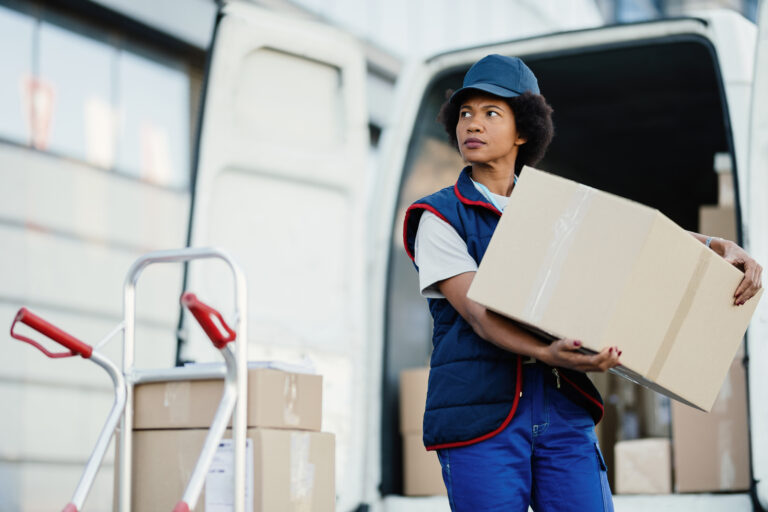If you’ve ever ordered food, groceries, or gadgets online and had them delivered to your doorstep, you’ve seen the logistics chain in action. But what if you could be the one cashing in on it?
With Nigeria’s e-commerce and mobile economy exploding, logistics and last-mile delivery have become one of the most lucrative yet underrated sectors.
Entrepreneurs who understand the gaps in infrastructure, customer urgency, and technology adoption are quietly building wealth through courier bikes, micro-hubs, and delivery software.
Let’s get to know why logistics isn’t just moving things from Point A to B—it’s a smart path to financial freedom.
Why Logistics Is Booming in Nigeria
1. The E-commerce Surge
Platforms like Jumia, Konga, and Instagram stores have changed how Nigerians shop. But delivery is often a dealbreaker for customers—fast, reliable, and affordable service wins loyalty.
- According to Statista, e-commerce revenue in Nigeria hit $6 billion in 2024 and is projected to grow at 11% CAGR.
- Every online sale needs logistics, often fulfilled by third-party riders or fleets.
2. Urban Congestion = Opportunity
Lagos, Ibadan, Abuja, and Port Harcourt all face congestion issues. This gives rise to bike courier businesses and micro-fulfillment hubs. Smart entrepreneurs use small teams to handle high-density zones with speed.
3. The Informal Sector is Digitizing
Even small market women, cake bakers, and pharmacies need logistics but lack access to big services. Tailored solutions for informal businesses are unlocking untapped wealth.
Business Models Making Money Today
1. Solo Logistics Rider
Start with one bike. Fulfill short-distance deliveries for food vendors, online sellers, or schools. Low overhead. Fast return.
2. Fleet Management
Own 5–10 bikes. Hire riders. Use delivery management software like Gokada Dispatch, Kobo360, or Kwik. You earn from multiple delivery jobs daily.
3. Third-Party Fulfillment Center
Offer warehouse space and inventory storage for small online sellers who can’t afford it. Add delivery as a service.
4. White-Label Tech Solutions
Build or license a delivery tracking and payment app. Offer it to businesses that want their own branded system.
5. Niche Delivery (Medicine, Groceries, Frozen Goods)
Cold-chain delivery and specialty goods are in high demand. Delivery startups in this space earn premium fees for speed and safety.
Key Tools & Tech Smart Entrepreneurs Are Using
- Rider GPS Apps—Google Maps, Traccar, Glim Delivery
- Order & Fleet Management—Dellyman, EasyDispatch, ParcelRun
- Mobile Payment Integration—Flutterwave, Paystack
- Digital Branding—Instagram, WhatsApp Business, mini e-commerce sites (like Paystack Storefront or Selar)
Real Data: How Big Is the Opportunity?
- Last-mile logistics accounts for 53% of total delivery cost—this is where small businesses win with local knowledge.
- Over 80% of e-commerce transactions in Nigeria are fulfilled within urban and peri-urban regions—ripe for short-haul delivery solutions.
- A single dispatch rider doing 15–20 trips/day can generate ₦10,000–₦25,000 daily gross. Multiply that by a fleet of 5–10.
Tips to Win in the Logistics Space
Start Small, Scale Fast
Don’t wait to own 10 bikes. One bike, one client, consistent delivery = income. Reinvest your profits into expansion.
Focus on Customer Experience
Speed, transparency, and respect matter. Send real-time updates, arrive on time, and handle packages carefully—this creates repeat business.
Build Strategic Partnerships
Collaborate with small e-commerce sellers, cake vendors, pharmacies, or tech repair shops. Be their exclusive delivery partner.
Stay Visible Online
Use WhatsApp status, Instagram Reels, Google My Business, and Facebook Marketplace to get found locally.
Understand the Law
Register your business with CAC, comply with local transport regulations, and get delivery permits if needed.
What Makes Logistics a Hidden Wealth Channel?
- Low Entry Barrier: You can start with as little as ₦400,000–₦600,000 for a decent bike, helmet, and app access.
- Recurring Revenue: Delivery is not a one-time product—it’s a service used repeatedly.
- Scalable: From solo rider to regional fleet in under 12 months if managed properly.
- Low Customer Churn: Once you deliver reliably, businesses stick with you.
- Tech Advantage: With apps and automation, you can manage riders, clients, and cash flow from your phone.
Future Trends to Watch
- Drone and robot deliveries—not yet widespread, but early adopters will profit when they land.
- AI route optimization—tools that save time and fuel.
- Green delivery (electric bikes)—growing demand as fuel prices rise.
- Delivery-as-a-Service platforms—white-labeled logistics marketplaces for SMEs.
Finally
In Nigeria’s ever-evolving economy, logistics and last-mile delivery aren’t just support services—they’re wealth vehicles for smart entrepreneurs.
Whether you’re starting with one bike or managing a fleet, there’s room to grow and dominate your niche.
Think about it: every online order, every market woman with a customer across town, every pharmacy that needs urgent dispatch—is a business opportunity for you.
The road to wealth might be bumpy, but if you control the route, you control the profit.


